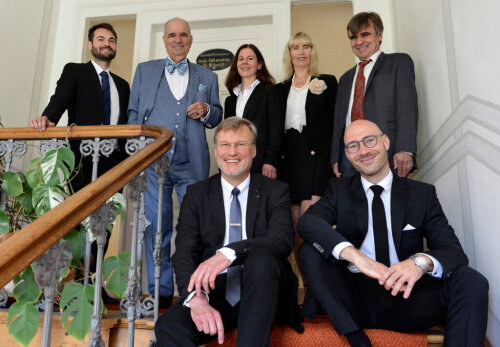Best Collaborative Law Lawyers in Bamberg
Share your needs with us, get contacted by law firms.
Free. Takes 2 min.
Free Guide to Hiring a Family Lawyer
List of the best lawyers in Bamberg, Germany
About Collaborative Law in Bamberg, Germany
Collaborative Law is an alternative dispute resolution process that is gaining popularity in Bamberg, Germany, especially in family law cases such as divorce or child custody matters. Instead of resolving disputes through traditional court litigation, Collaborative Law engages both parties and their respective lawyers in a cooperative, confidential setting. The goal is to reach mutually beneficial agreements without going to court, minimizing conflict and fostering open communication. The Collaborative Law process in Bamberg is based on principles of transparency, voluntary participation, and respect, following models established throughout Germany and Europe.
Why You May Need a Lawyer
Collaborative Law can offer significant advantages for people seeking amicable and efficient dispute resolution, but having a lawyer is highly recommended. Here are common situations in Bamberg where you might need a Collaborative Law lawyer:
- Family disputes such as divorce, separation, or arrangements for children
- Distribution of assets, including property and financial settlements
- Disagreements involving parental responsibilities or custody
- Post-divorce modifications to original agreements
- Business or partnership disputes that impact personal relationships
- Desire for a private, non-adversarial process instead of going to court
- Complex emotional or financial circumstances needing expert guidance
A trained Collaborative Law lawyer will help guide negotiations, protect your interests, ensure legal requirements are met, and help craft lasting agreements.
Local Laws Overview
In Bamberg, Collaborative Law operates within the general legal framework of Germany but has particular local customs and professional networks. Key local legal aspects include:
- Collaborative Law is voluntary; participation requires the agreement of both parties.
- Each party retains their own lawyer, specially trained in Collaborative Law.
- Legal confidentiality is preserved within the collaborative process.
- If the collaborative process breaks down, participating lawyers may not continue to represent their clients in subsequent litigation-a principle ensuring commitment to settlement.
- The process is often applied in areas regulated by the Bürgerliches Gesetzbuch (BGB, German Civil Code), especially in family law matters.
- Local bar associations and family law councils in Bamberg often support professional development and standards for Collaborative Law.
- Agreements reached through Collaborative Law can be made legally binding through notarial certification or by approval in family court, depending on the type of agreement.
Frequently Asked Questions
What is Collaborative Law?
Collaborative Law is a method of resolving disputes respectfully and privately without going to court. Both parties work together, each with their own lawyer, to negotiate a mutually satisfactory agreement.
What types of cases are suitable for Collaborative Law in Bamberg?
Collaborative Law is most frequently used for family law issues such as divorce, child custody, and asset division, but it can be adapted for other civil disputes where parties wish to maintain a cooperative relationship.
Is Collaborative Law legally recognized in Germany?
Yes, while there is no separate statute, Collaborative Law processes are fully recognized and supported within the German legal system, especially when agreements are finalized in line with civil law requirements.
What happens if we can’t agree during the Collaborative Law process?
If the process fails and agreement is not reached, the collaborative lawyers must withdraw, and new legal representatives are needed if the matter goes to court.
Do both parties need a Collaborative Law lawyer?
Yes, each party must have their own independently trained Collaborative Law lawyer to ensure advice is impartial, and interests are fairly represented.
Can Collaborative Law cover issues like child support and spousal maintenance?
Yes, all financial and child-related arrangements, including child support and spousal maintenance, can be negotiated and agreed upon within the Collaborative Law setting.
Is the Collaborative Law process confidential?
Yes, discussions and negotiations within the Collaborative Law process are strictly confidential, unless both parties agree otherwise or where disclosure is required by law.
How long does the Collaborative Law process typically take in Bamberg?
The duration depends on the complexity of the issues and the willingness of parties to work together, but it usually takes less time than traditional court proceedings.
What qualifications should my Collaborative Law lawyer have?
Seek lawyers who are members of local bar associations (such as the Rechtsanwaltskammer Bamberg) and have completed special training or certification in Collaborative Law.
How do I make the final agreement legally binding?
Upon reaching an agreement, your lawyers will help formalize it-often through notarization or court approval, ensuring it is enforceable under German law.
Additional Resources
- Bamberg Bar Association (Rechtsanwaltskammer Bamberg)-for lawyer directories and professional support.
- Local family courts (Familiengericht Bamberg)-for guidance on formalizing agreements.
- German Association for Collaborative Practice (Deutsche Gesellschaft für das Kollaborative Verfahren)-for information and practitioner listings.
- Family counselling services and mediation centers in Bamberg-for additional support alongside legal advice.
- City of Bamberg legal advice centers-for confidential legal guidance and referral services.
Next Steps
If you think Collaborative Law may be right for your situation in Bamberg, consider these steps:
- Reflect on your goals and whether a cooperative, non-adversarial process would benefit you.
- Search for a local lawyer trained in Collaborative Law, using the resources listed above.
- Schedule an initial consultation to discuss your case and learn how Collaborative Law can be applied in your circumstances.
- Speak with the other party to gauge their willingness to participate in the Collaborative Law process.
- Prepare relevant financial, personal, and legal documents to enable effective negotiations.
- Work with your lawyer to understand your rights, options, and the likely steps ahead.
- Stay informed and engaged throughout the process to reach a lasting and practical agreement.
Collaborative Law can offer a respectful, efficient, and tailored path to resolving your legal issues in Bamberg. With proper preparation and expert legal guidance, you can navigate disputes with confidence and clarity.
Lawzana helps you find the best lawyers and law firms in Bamberg through a curated and pre-screened list of qualified legal professionals. Our platform offers rankings and detailed profiles of attorneys and law firms, allowing you to compare based on practice areas, including Collaborative Law, experience, and client feedback.
Each profile includes a description of the firm's areas of practice, client reviews, team members and partners, year of establishment, spoken languages, office locations, contact information, social media presence, and any published articles or resources. Most firms on our platform speak English and are experienced in both local and international legal matters.
Get a quote from top-rated law firms in Bamberg, Germany — quickly, securely, and without unnecessary hassle.
Disclaimer:
The information provided on this page is for general informational purposes only and does not constitute legal advice. While we strive to ensure the accuracy and relevance of the content, legal information may change over time, and interpretations of the law can vary. You should always consult with a qualified legal professional for advice specific to your situation.
We disclaim all liability for actions taken or not taken based on the content of this page. If you believe any information is incorrect or outdated, please contact us, and we will review and update it where appropriate.













